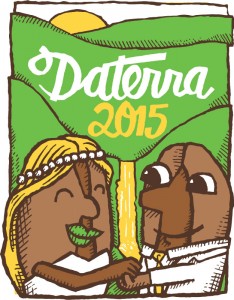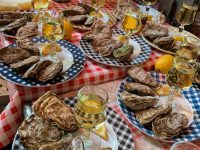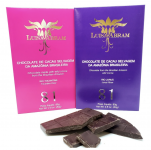Love in the Time of Coffee
The Cerrado region of Brazil is an enormous, sprawling savanna that occupies the central part of the country. It comprises about 500 million acres of land (an area roughly three times the size of the State of Texas) and is the most biologically diverse savanna on the planet. The region is home to over 800 species  of birds, nearly 200 types of mammals, and over a hundred kinds of reptiles. Plant biodiversity includes more than 10,000 species of plants, of which hundreds are found nowhere else. The Cerrado climate is humid and subtropical, covers about 23% of Brazil’s total area, and the region feeds three major water basins in the continent of South America: the Paraguay, the São Francisco, and the Amazon rivers.
of birds, nearly 200 types of mammals, and over a hundred kinds of reptiles. Plant biodiversity includes more than 10,000 species of plants, of which hundreds are found nowhere else. The Cerrado climate is humid and subtropical, covers about 23% of Brazil’s total area, and the region feeds three major water basins in the continent of South America: the Paraguay, the São Francisco, and the Amazon rivers.
The savanna itself is comprised of a series of high sedimentary plateaus, ranging from 500 to 1700 meters above sea level, and interspersed with depressions varying from 100 to 500 meters. This rising and falling landscape is laid out in a gently rolling mosaic pattern; Cerrado translates as “hilly.” The soil of the area was once considered too acidic to grow much, but beginning in the 1980s Brazilian agronomists began large-scale application of lime to improve the land. Today, the region is responsible for the majority of the country’s farm produce.
It is deep within this vast biome and up on a high plateau that the beautiful Daterra Farm is located. Daterra is owned by Luis Paschoal, a descendent of Italian immigrant and family patriarch, Miguel
Paschoal. Miguel arrived in Brazil in 1902 when he was just 11 years old. In 1908, he embarked on his first entrepreneurial adventure when he began selling coffee by the cup in the Campinas City Market. These humble beginnings led first to a grocery store, then a gas station, and finally a chain of car service centers.
In 1980, Miguel’s descendants began to invest in agriculture just as the Brazilian government was implementing the soil improvement programs that would change the face of farming in the country for the better. Luis Paschoal originally raised cattle and grew fruit, but soon became enchanted with the beverage that started the family business all those decades earlier. In 1984, the company began to focus on the cultivation of sustainable and specialty coffees, and Daterra was born.
The word Daterra means, appropriately, “of the earth,” and the farm is the source of some of the world’s best Arabica coffee. The Daterra farm itself covers 5800 hectares (approximately 14,000 acres), and is actually three distinct farms within a larger estate; the main farm, and two small satellites. Luis and his staff are dedicated to sustainable practices and, aside from occasional mechanical or equipment needs, the farm is entirely self-contained. Recently, a brand new harvesting machine was completely designed and produced on the farm, utilizing state of the art techniques. The farm has a large composting area where the byproducts of coffee growing, harvesting, and processing are used to reinvest in the soil fertility, and the water used in the coffee bean-washing process is recycled. In addition, a large portion of Daterra has been set aside as permanent wetlands to hep sustain local wildlife and agriculture.
The relationship between Daterra and the Zingerman’s Coffee Company goes back more than a decade, and Daterra was one of the first coffee estates the Coffee Company worked with. Managing partner Steve Mangigian says he treasures his time on the verdant and lush plantation, and he nurtures a collaborative relationship with the farm to ensure consistent standards for the coffee he buys. A lot of time is spent evaluating the farm’s coffee varietals simply by tasting (“cupping” to coffee enthusiasts) the brew with an eye to such criteria as flavor, aroma, acidity or “brightness,” and the overall experience. This is an ongoing process, and Steve’s challenge is not simply to maintain as much consistency as possible in an agricultural product that’s subject to all manner of environmental influences on the beans, but also look for ways to make the coffee better in the cup.
Many of the benefits for developing long-term relationships with coffee growers are obvious. Steve can work with a grower over time to produce a bean tailored to the Coffee Company’s specific flavor profile. He’s able to have a first-hand understanding of the grower’s practices and their commitment to standards of quality. And Zingerman’s is able to trace the provenance of a particular coffee bean directly back to a specific plantation, along with all of the attendant “biography” information about how the crop was cultivated, harvested, and processed. Steve’s hope is that all of this care and attention to detail comes through in the flavor of our coffee. Because there’s no fooling a discriminating fan of the bean.
The long-lasting friendship between the Zingerman’s Coffee Company and Daterra has borne more ambitious fruit recently in a pilot program that will ultimately redefine the current definition of knowing where your coffee comes from. Daterra is implementing a plan to set aside a specific plot of land dedicated to a multi-year experimental project aimed at producing a coffee only for Zingerman’s. What this means is that it will now be possible to plant a specific varietal, process it in a certain way, and trace a brew from the bean directly back to the very field in which it was grown. This takes the notion of farm-to-cup to an entirely new level; where we used to know the coffee’s home village, we’ll now know its address!
The program represents a chance to take a more direct role in the specifics of bean cultivation. With his own dedicated field, Steve will be able to shape and hone the flavor profile of Zingerman’s coffee beans from the very beginning. We may just be witnessing the birth of our very own Zingerman’s varietal. But, the project will take some time. Young coffee trees generally need 3-4 seasons before they start producing good quality beans. And Steve will no doubt want to tinker a bit with the beans to make sure they’re just right… Regardless, we’re very excited by this prospect, and we encourage everyone to stay tuned for more details.
Steve made another trip to Daterra this past July, but the focus of this visit was a bit different than previous trip. Steve and his fiancé Katherine were married at Daterra Estate, in the beautiful and lush savanna of the Cerrado. When I asked why he chose to hold his nuptials in the heart of Brazil, he talked about what Daterra, and his relationship with them has meant to him. Daterra owner Luis Paschoal exemplifies many of the ideals that Zingerman’s espouses; he treats his land and his people well, the farm has good energy, and they continually look toward innovation and improvement. Steve likes the farm’s transparency and openness, their commitment to sustainable, renewable practices, and their responsible stewardship of the delicate environment of the Cerrado.
Steve tells me that three years ago, when his relationship with Katherine had moved to a new level, he brought her to visit Daterra Farm. The experience, he says, was foundational to their relationship and it became clear that their paths would ultimately merge into one. “It was a touchstone moment,” he says. So when the time came to choose a place to formally acknowledge the love already present, Steve really wanted to evoke a connection to what the original trip had represented for the couple. Daterra, for its part, was very enthusiastic about the idea, and insisted on handling all the wedding details themselves.
About this time, Linda Smithers, Daterra’s longtime US representative, also announced her intention to wed her fiancé, Howard, and overnight the event became a double wedding. This being the farm’s first wedding, Luis and Daterra went all out, arranging everything while the couples relaxed at the farm’s very comfortable guest house. The ceremony was officiated by Luis, and attended by 75 guests, mostly friends from the farm as well as a few international guests. A feast of traditional Brazilian dishes were served, and after dinner there was music and dancing into the night.
Before he flew to Brazil, Steve told me that he was looking forward to getting married and taking the next step in his life. He also shared another detail; three years earlier, Daterra had planted a tree on the farm in the couple’s honor. It was apparent to everyone even then that the couple had something special, something moving toward an inevitable convergence. Their tree at Daterra is a wonderfully romantic expression of the time, patience, and love necessary to grow and strengthen something beautiful. On this most recent visit both Steve and Katherine along with other witnesses observed that this planted tree had grown faster and bigger than most that had been planted in the past. A person has to wonder if the farming life doesn’t perhaps inspire a lovely poetic gesture now and then.




Zingerman’s Art for Sale